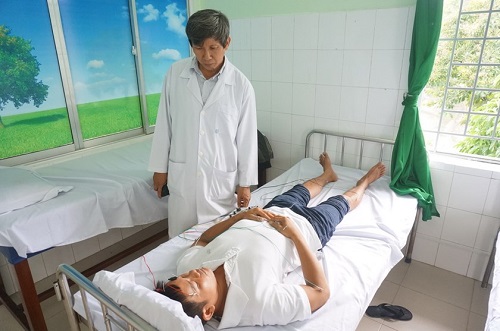Da Nang doctors claim to have homeopathic cure for heroin addiction
After successfully treating three hardened addicts, doctors in Da Nang are hopeful that they've developed a successful, homeopathic treatment for heroin addiction and withdrawal.
The patients said they had been addicted to heroin for between six and ten years. They had all relapsed after being released from various compulsory rehabilitation centers. Now, they say, they're cured.
The patients submitted to six sessions of electro-acupuncture every day for around a week between September 29 and October 9 at the Da Nang Traditional Medicine Hospital.
 |
| A doctor at the Da Nang Traditional Medicine Hospital observes a drug addict undergoing homeopathic treatment. |
The acupuncture treatment was developed to stimulate the brain's endorphins (or endogenous morphine) and prevent cravings. The acupuncture sessions are supplemented with so-called "fire treatments" in which the practitioner applies an herbal paste to a patient's body, covers it with a towel soaked in an alcohol solution and then lights it on fire.
Patients and doctors say the resulting heat is pleasant and soothing.
One patient, 34 years old, said the first days of his treatment went very smoothly, compared to previous rehabilitation efforts.
“I did not feel agitated; I didn't feel maggots crawling in my bones.
“And I did not feel the need to hurt myself, by banging my head into the wall, biting my hands and feet until they bled, or to hurt others around me,” he said.
He said the doctors kept watch over him throughout the course of his treatment.
Whenever he felt cravings, they gave him a session, and his need for the drugs subsided.
“I can sleep without sedatives,” he said.
Another patient, T.T.A., 28, said he was addicted for seven years.
“The treatment this time was short but really effective,” A. said.
“I came back and did not crave drugs like in previous times.”
Tests have proven that A. is clean of drugs, but he still seeks regular therapy sessions, in addition to the herbal regimen prescribed by doctors.
Doctor Huynh Su who is in charge of drug addiction treatment at the hospital, said: “The patients got rid of their cravings quite smoothly from the first days.”
Su said outpatients are prescribed herbs that they must take every day to continue the detoxification process.
They also need to continue receiving electro-acupuncture and fire therapy every two days for two months after their release." I did not feel the need to hurt myself, by banging my head into the wall, biting my hands and feet until they bled, or to hurt others around me" -- a 34-year-old drug addict being treated at the Da Nang Traditional Medicine Hospital.
He said the patients also need physical therapy and psychological consultation sessions to overcome future temptations.
Doctor Nguyen Tai Thu, vice chairman of the International Acupuncture Association and vice chairman of its Vietnam version, brought the therapy to the hospital.
Thu said the therapy is designed to stimulate the brain to produce extra endorphins.
“When one uses drugs, the body stops producing morphine. So when the drug supply is disrupted, there’s a lack of the endogenous morphine, which leads to cravings.”
His method was designed for drug users who had been using heroin for a year.
So doctors at the Da Nang hospital made adjustments to suit the treatment to heavier users.
Doctor Phan Cong Tuan, of the hospital, said successful patients offer convincing evidence for addicts in the community to seek out this "short, painless treatment."
“They have been encouraging each other and more patients are coming to see us.”
Nguyen Van Dung, deputy director of the hospital, said they have plans to hire the discharged patients as assistant massage therapists and herb gardeners.
The Health Ministry has approved the treatment, due to the rise of drug use in Viet Nam and the low success of both forced and community-based voluntary rehab programs.
Luong Ngoc Khue, head of the ministry’s Examination and Treatment Department, said: “It’s very hard to eliminate the idea of having drugs completely. It takes a lot of will.”
“Each patient needs long-term medical and spiritual support,” Khue said.
(Source: www.thanhniennews.com)




